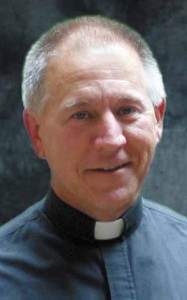By Father Bud Grant
Benjamin Blonder won the BMC Ecology photo prize in “Landscape Ecology” for an image of California’s Death Valley. Commenters noted that the plants (creosote plants, maybe?) are growing in “unusually regular arrangements.” How’s that happened? Death Valley gets about 2 inches of rain a year. Ecologically, the plants’ “arrangement” has something to do with their being competitively spaced, like rain farmers harvesting scant moisture from “their” ground. Thus, the “order” is not a conscious arrangement, but an adaptation, at once rationally explicable and randomly arrived at.

This is where the great natural law debate gets fun. Is there a conscious “Arranger” behind evolution’s chancy and capricious ebb and flow? Does the range of divine dictate extend to us? Are we as determined by the laws of nature as a creosote bush or penguin? If so, would it be possible to use those laws to predict our futures the way we do next week’s weather?
Stoicism’s advice is to keep calm in good times and bad, making the most out of what we are dealt and suppressing desires. Stoicism, in practice if not by name, thrives in pragmatically minded America. It’s a Midwestern thing, given farmers’ dependency on the rule of nature even while enduring its frustrating vicissitudes. Stoicism reminds me of my father too: a World War II veteran, Dad exuded a quiet ethos of hard work, personal discipline, frugality and endurance of hardship. In “Stoic Warriors” author Nancy Sherman supports my hunch that there is a natural predilection of soldiers toward stoicism, given their need to manage stress and grief … soldiers and farmers … and laborers of all sorts, probably.
Stoic natural determinism claims that nature’s laws are inviolable, like gravity or thermodynamics. This applies to ethical laws: the same actor doing the same thing in the same situation will or will not be ethical, every time. We can rationally analyze such actions, retrospectively, at least, following the sequence of effects and causes backward until we can rationally judge: “Well, of course it was bound to work out that way!” However, if there are any changes to any of the causes or effects, if it isn’t the same actor or the same action, in the same situation, then the result will not be the same.
Change the recipe, you change the cake. Moreover, there are so many external causes over which we have no control and so many conflicting internal causes that influence our “inner state” that etiological predictions of outcomes are impossible.
Whether dealing with nature or our own ethical selves, we are much better at post factum explanations than at predicting future consequences. Yet, knowing that we can at least control our “inner states,” we can train ourselves toward certain virtues that will make one kind of outcome more likely than another, like a farmer employing a new-climate adaptive hybrid. So a soldier can train herself to appropriate expressions of grief, a teacher to deeper reservoirs of patience, all of us to enhanced empathy.
In the very odd and decidedly non-biblical film “Noah” (read the fascinating review by Rabbi Yonassan Gershom on Amazon’s rental site), the title character attempts stoic detachment, believing that he has simply to obey what he perceives to be God’s genocidal orders. Only when he cracks, finding the orders to be finally intolerable, can his daughter-in-law suggest that perhaps God had picked him, not because of his blind obedience to appalling orders, but because of his moral capacity — his character.
To this sensible attitude toward the “determinacy” of nature, theologians add a crucial element. Creator God loves nature and us. Fate is not a secret unyielding decree, no divine plan steam rolls over free will. There remains what the Greeks call the Eph’ Hemin, an “up to us”-ness called free choice. And one more thing, divine mercy: we are forgiven.
(Father Bud Grant is a professor of theology at St. Ambrose University in Davenport.)








